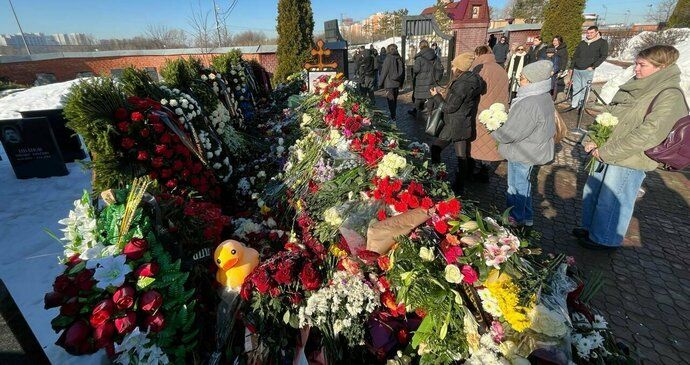As the British newspaper The Sun writes, Russian President Vladimir Putin ordered his secret agents to prevent a possible riot that could develop from the procession heading to the cemetery where the late opposition leader Alexei Navalny is buried. The dictator fears that the situation of 1989 could be repeated, when Andrei Sakharov, a leading Soviet physicist, dissident and human rights defender, had a funeral.
Meanwhile, unpleasant situation for the kremlin butcher as hundreds of people of all ages continue pouring into the funeral place of Alexey Navalny to pay their respects. pic.twitter.com/Sh2fWHtHpx
— WarTranslated (Dmitri) (@wartranslated) March 2, 2024
Putin to agents of the Federal Security Service (FSB) ordered them to carry out an “operation” to “protect the constitutional order from threats”. “The task of the FSB is to prevent a riot similar to the one that happened during Sakharov’s funeral,” the official told The Moscow Times newspaper.
Sakharov was a Nobel Prize-winning scientist who spent his life developing nuclear weapons for the Soviet Union. However, he was more known for his political activism and also warned against the use of nuclear weapons, which antagonized the Soviet government.
The scene at Moscow’s Borisovskoye cemetery this morning. Russians continue to place flowers on the grave of Alexei Navalny. There’s now a mountain of floral tributes to the late opposition leader. @BBCNews #Navalny pic.twitter.com/Eco5N2gJMf
— Steve Rosenberg (@BBCSteveR) March 3, 2024
Like Navalny, he became the leader of a growing opposition movement against the Soviet Union and faced oppression. His funeral in 1989 was attended by 50,000 people and was described as a “grim procession” as people showed their support for the Russian opposition at the time. This event illustrates how the country was prepared for a major political change. She was one of the first steps to make the Soviet Union the then president Mikhail Gorbachev fell apart
Putin implemented maximum measures to prevent a similar scenario with the funeral of Alexei Navalny. For example, state and loyalist media were ordered not to report on the parade.
Two senior sources also say Navalny’s death has also caused unrest among senior Russian government officials. The Kremlin “held a series of meetings with the commanders of the Federal Security Service and the Ministry of Internal Affairs after the death of the Russian opposition leader.”
“Navalny’s funeral is a stressful test for the Russian leadership,” said an official the server spoke to earlier. “This topic was one of the most important in meetings with Kremlin officials, FSB commanders and the Ministry of Internal Affairs.”
“Who Killed Navalny?”
Tens of thousands of people attended Navalny’s funeral and chanted slogans supporting Ukraine and opposing the war and Putin. A day after the opposition leader died, Russian police arrested more than 400 people across the country at memorials and rallies honoring the opposition leader. Another six people were detained in Moscow during the funeral procession. One of them was a man who shouted: “Who killed Navalny?”
Even two days after the funeral, crowds of people come to say goodbye to Navalny. “Many thanks to those who came to say goodbye to Alexei these days. Thank you for bringing the flowers and photos, thank you for your support. There is always a queue at the cemetery, so it’s a good idea not to arrive too late. The cemetery is open from 9 a.m. to 5 p.m.,” wrote Kira Jarmyšová, X Navalny’s spokesperson, on the social network.
It is said to be the largest public gathering since the anti-Putin protests were led by opposition politician Boris Nemtsov. “Good video showing the population that turned out for Alexei Navalny’s funeral in Moscow. It is the largest public gathering since the anti-Putin protests led by Boris Nemtsov more than 10 years ago, before he was also assassinated by Putin.” wrote on X Igor Suško, director of the non-profit organization Wind of Change Research Group.
Strictly guarded
However, people who do come risk arrest, The Moscow Times newspaper reported. Russian police have installed detection frames at the entrance to the cemetery and are also searching those who came to pay their respects to the Kremlin’s biggest critic. In addition, people are constantly forced not to stand still.
Some supporters brought banners with Navalny’s slogans or some souvenirs, for example, the yellow duck, a symbol of the corruption investigation of Putin’s long-time ally and former president Dmitry Medvedev, which was just revealed by the opposition leader.
The second day after Alexei Navalny’s funeral
People continue to carry flowers to his grave. pic.twitter.com/EXTdg3xswU
— NEXTA (@nexta_tv) March 3, 2024
AFP journalists also interviewed several people who came to say goodbye. 50-year-old artist Natalia, who declined to give her last name, she told the agency she felt “pain, despair and hope”. “In the end, Alexei asked us not to despair, but to fight,” she said at the cemetery.
Another mourner, 52-year-old Vadim, said he felt “sadness and bitterness at the loss of a respectable man of our time”. He urged Navalny’s supporters to follow his legacy and “live the way Alexei wanted to live, so that people in our country and in the world live more happily.”
People keep walking pic.twitter.com/yyq9B8RYuB
— Kira Yarmysh (@Kira_Yarmysh) March 3, 2024
Other mourners were noticeably less optimistic. “It is sad. And it’s just clear that everything that has been built up with him over the years has also been buried here.” said 29-year-old IT worker Roman.
The rights watchdog group OVD-Info said that Russian police on Friday arrested at least 128 people who attended memorial services for Navalny in 19 cities.
Thousands marching in support of Navalny, demanding an end to Russia’s offensive in Ukraine and criticizing the Kremlin, have not been seen in Russia since February 2022, when Moscow launched its invasion of Ukraine.
View full online










